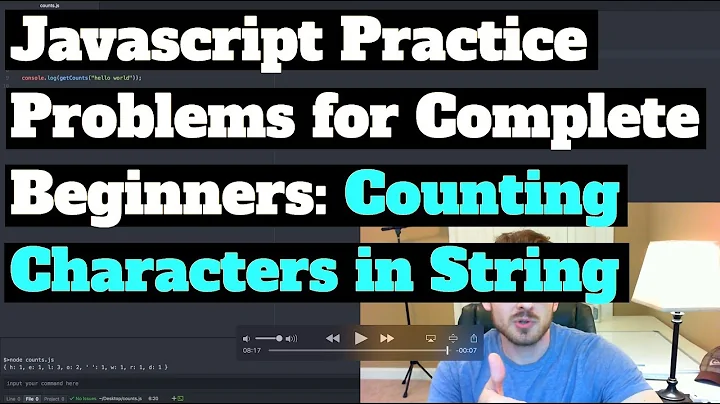Split string at space after certain number of characters in Javascript
Solution 1
A short and simple way to split a string into chunks up to a certain length using a regexp:
const chunks = str.match(/.{1,154}(\s|$)/g);
some examples:
const str = 'the quick brown fox jumps over the lazy dog';
console.log(str.match(/.{1,10}(\s|$)/g))
console.log(str.match(/.{1,15}(\s|$)/g))This works because quantifiers (in this case {1,154}) are by default greedy and will attempt to match as many characters as they can. putting the (\s|$) behind the .{1,154} forces the match to terminate on a whitespace character or the end of the string. So .{1,154}(\s|$) will match up to 154 characters followed by a whitespace character. The /g modifier then makes it continue to match through the entire string.
To put this in the context of your function:
function splitText() {
"use strict";
var str = document.getElementById("user_input").value;
var chunks = str.match(/.{1,154}(\s|$)/g);
chunks.forEach(function (i,x) {
$("#display").append("<textarea readonly>" + chunks[x] + "</textarea><br/>");
});
}
Note (as has been pointed out in the comments) that this code will fail if one of the words in the string is longer than the length of the chunks.
Solution 2
you could use a simple function like this:
function split(string) {
for(i=154; i>=0; i--) {
if(string.charAt(i) == " ") {
var newString1 = string.slice(0, i);
var newString2 = string.slice(i);
}
}
}
Instead of assigning to separate strings you can always put them into an array if you'd like as well.
Related videos on Youtube
Leminnes
Updated on June 09, 2022Comments
-
Leminnes almost 2 years
I am attempting to create a tool that takes an input text and splits it into chunks of text at a certain # of characters. However, I need to make sure it does not split the text in the middle of a word.
In my case, I am splitting the string after 155 characters.
I've done quite a lot of searching to try and find a solution, but I fear it may be more complicated than my knowledge of Javascript allows me to figure out. I believe I just need to make some sort of logic that has the splitter backtrack to a space to split if it is in the middle of a word, but I am not sure how to write out such a thing.
Here is my javascript code at the moment:
function splitText() { "use strict"; var str = document.getElementById("user_input").value; var size = 195; var chunks = new Array(Math.ceil(str.length / size)), nChunks = chunks.length; var newo = 0; for (var i = 0, o = 0; i < nChunks; ++i, o = newo) { newo += size; chunks[i] = str.substr(o, size); } var newq = 0; for (var x = 0, q = 0; x < nChunks; ++x, q = newq) { $("#display").append("<textarea readonly>" + chunks[x] + "</textarea><br/>"); } }And here is my HTML:
<body> <content> <h1>Text Splitter</h1> <form> <label>Enter a Message</label> <input type="text" name="message" id="user_input"> </form> <form> <input type="button" onclick="splitText();" id="submit" value="Submit!"> <br/> </form> <label>Your split message: </label> <p><span id='display'></span></p> </content> </body>Here is the code in its current working form, if you'd like to take a look: https://jsfiddle.net/add4s7rs/7/
Thank you! I appreciate any assistance!
-
 blex about 6 yearsI think you misinterpreted the question. He needs to split the text into chunks, not just cut it and get the first chunk :-) (sorry if I misspelled your name in my answer)
blex about 6 yearsI think you misinterpreted the question. He needs to split the text into chunks, not just cut it and get the first chunk :-) (sorry if I misspelled your name in my answer) -
 Scott Marcus about 6 years@blex I don't know about that. I asked him a couple of clarifying questions in his original question and this is what I believe he's asking. We'll see I guess.
Scott Marcus about 6 years@blex I don't know about that. I asked him a couple of clarifying questions in his original question and this is what I believe he's asking. We'll see I guess. -
 blex about 6 yearsTry his JS Fiddle with a really long text, and you'll see multiple
blex about 6 yearsTry his JS Fiddle with a really long text, and you'll see multipletextareas as a result, while your answer only outputs onetextContent -
 Scott Marcus about 6 years@blex I did. It seems to be doing what my code does (except his doesn't get the count right).
Scott Marcus about 6 years@blex I did. It seems to be doing what my code does (except his doesn't get the count right). -
 Scott Marcus about 6 years@blex I had a couple of UI corrections to make to better emulate what the OP's fiddle does if that's what you mean, but the algorithm hasn't changed.
Scott Marcus about 6 years@blex I had a couple of UI corrections to make to better emulate what the OP's fiddle does if that's what you mean, but the algorithm hasn't changed. -
 Adriano about 6 yearsYou don't want to create a loop that goes 154 times through the string just to count to 155. You know that you want to manipulate the string after the 154th character; just do it! ;)
Adriano about 6 yearsYou don't want to create a loop that goes 154 times through the string just to count to 155. You know that you want to manipulate the string after the 154th character; just do it! ;) -
Leminnes about 6 yearsFor whatever reason, when I try to use this on my local version, it does not work. I click the submit button and nothing happens. I'll keep messing around and see if I can get it to work.
-
 Cory Kleiser about 6 yearsThe loop is counting down from 154 until it gets to a space.
Cory Kleiser about 6 yearsThe loop is counting down from 154 until it gets to a space. -
Leminnes about 6 yearsI figured it out, I'm just an idiot. The others are right, I want to be able to display every string of that length.
-
Leminnes about 6 yearsThis worked quite well except that for the last string it cuts off the last word. Is there a way to fix that?
-
 Nick about 6 yearsOops! Fixed the regexp now. Sorry about that - I should have noticed in my examples.
Nick about 6 yearsOops! Fixed the regexp now. Sorry about that - I should have noticed in my examples. -
Leminnes about 6 yearsAh, thanks much! One more related but unrelated question. If I wanted to add a character, say a + to the end of every line but the very last one, would that be possible?
-
 Nick about 6 yearsYou could change
Nick about 6 yearsYou could changechunks[x]tochunks[x].replace(/(\s)$/, '$1+')or (if you want to get rid of the trailing whitespace on the first strings)chunks[x].replace(/\s+$/, '+') -
Leminnes about 6 yearsThat worked perfectly. I should really learn more regex. It seems so powerful, just so immensely confusing haha
-
 Nick about 6 yearsYes and Yes! There's a good site to play with them at regex101.com
Nick about 6 yearsYes and Yes! There's a good site to play with them at regex101.com -
Leminnes about 6 yearsFinal question for you, since I've been trying to figure it out without resorting to asking, but so far I have failed. Similar to above, how would I add a character, like + again, to the beginning of the strings in all but the first string?
-
 Nick about 6 yearsReplace
Nick about 6 yearsReplacechunks[x]with(x == 0 ? chunks[x] : '+' + chunks[x]). -
 Nick about 6 yearsNote that in my solution (and in all these comments), you should use
Nick about 6 yearsNote that in my solution (and in all these comments), you should useiinstead ofchunks[x](since that is whatiis set to in each iteration offorEach()). -
Cody Moniz over 4 yearsnote: this will fail for words longer than (154) characters
var str = 'the quick brown fox somersaulted over the lazy dog'; console.log(str.match(/.{1,10}(\s|$)/g))(5) ["the quick ", "brown fox ", "mersaulted ", "over the ", "lazy dog"] -
 Nick over 4 years@CodyMoniz you are right - but I don't know of any words that are that long. The longest word in an English dictionary is only 45 letters.
Nick over 4 years@CodyMoniz you are right - but I don't know of any words that are that long. The longest word in an English dictionary is only 45 letters.






